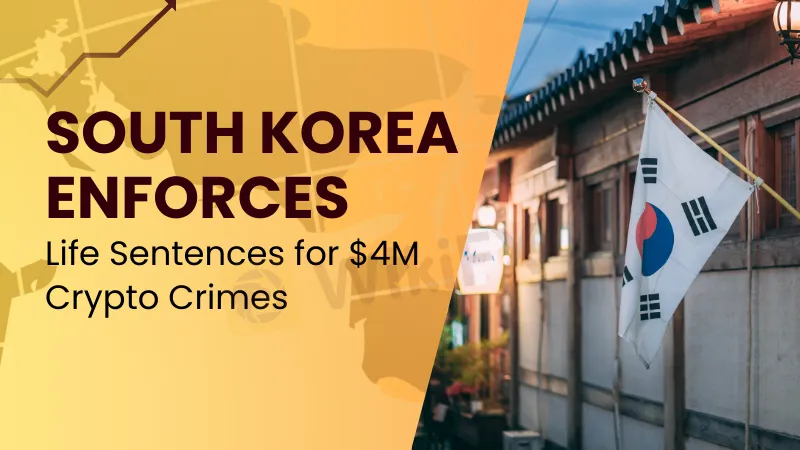简体中文
繁體中文
English
Pусский
日本語
ภาษาไทย
Tiếng Việt
Bahasa Indonesia
Español
हिन्दी
Filippiiniläinen
Français
Deutsch
Português
Türkçe
한국어
العربية
South Korea Enforces Life Sentences for $4M Crypto Crimes
Abstract:South Korea enforces life sentences for $4M crypto crimes as part of new regulations to safeguard the digital asset market under the Virtual Asset Users Protection Act.

South Korea has made strict efforts to combat unlawful cryptocurrency activity. Individuals convicted of crypto crimes worth more than $4 million (5 billion won) now face life imprisonment. This decision comes after implementing the Virtual Asset Users Protection Act, which intended to strengthen monitoring and provide a safe environment for digital asset transactions.
Increasing Regulatory Scrutiny in South Korea's Crypto Market

The Financial Supervisory Service (FSS), under Chief Lee Bok-hyun, has increased its monitoring of the virtual asset market. Speaking to CEOs from 16 cryptocurrency companies, Lee stressed the government's determination to enforce the Virtual Asset Users Protection Act, which went into effect on July 19, 2024.
The FSS has underlined its zero-tolerance approach to unlawful cryptocurrency transactions. If fraudulent acts are detected, all investigative resources will be focused on ensuring compliance and pursuing offenders. Monitoring market volatility and limiting the dissemination of incorrect information, especially regarding newly listed cryptocurrencies, are priority concerns for the FSS.
Stricter Inspections and Continuous Regulatory Changes
The FSS has previously declared preparations to investigate two bitcoin exchanges where strange trading patterns were discovered. In addition, three additional exchanges and a wallet provider will be subjected to frequent inspections to guarantee compliance with new legislation.
Lee Bok-hyun also hinted at possible changes to current law, indicating the prospect of a “second phase” of regulatory reforms. Close interaction with companies and related authorities will be critical as the government develops a more rigorous framework for managing virtual assets.
Origins of the Virtual Asset Users Protection Act
The Virtual Asset Users Protection Act arose from the disastrous aftermath of Terraform Labs, a South Korean blockchain business, failing in May 2022. This episode resulted in worldwide market losses of more than $450 billion, spurring urgent legislative action to rectify regulatory weaknesses and protect investors.
Under the new regulatory framework, bitcoin exchanges must now create sophisticated monitoring systems to identify illicit behavior. The new laws also ban market manipulation, insider trading, and other unfair acts, and individuals who participate in such behavior face harsh penalties.
Stronger Monitoring Systems for Exchanges
Industry experts have emphasized the relevance of the “order book information loading system,” which the new regulation requires. This approach guarantees that bitcoin exchanges keep complete records of all trading operations, enabling regulators to discover and respond to situations of unfair trading practices.
South Korea's implementation of these stringent regulations demonstrates its intention to build a safer and more transparent virtual asset market, providing better security to investors and discouraging prospective scammers.
A Firm Position on Crypto Crimes
South Korea's recently implemented legislation constitutes one of the world's most stringent responses to cryptocurrency crimes. The prospect of life sentences for offenders highlights the government's determination to address the rising hazards in the digital asset market. The new regulations are anticipated to transform how cryptocurrency firms operate in the nation, with the ultimate objective of creating a more secure financial environment for all stakeholders.
Stay updated on South Korea's crackdown on crypto crimes and new regulations. Visit the WikiFX news page for the latest insights into the virtual asset market

Disclaimer:
The views in this article only represent the author's personal views, and do not constitute investment advice on this platform. This platform does not guarantee the accuracy, completeness and timeliness of the information in the article, and will not be liable for any loss caused by the use of or reliance on the information in the article.
Read more

Anti-Scam Groups Urge Tougher Action on Fraudsters in UK
Anti-scam groups demand tougher police action on fraudsters as UK fraud rates surge 19%, targeting millions in a penalty-free crime spree exposed by a $35m scam leak.

Philippines Deports 29 Indonesians Linked to Online Scam Syndicate in Manila
Online scam groups in the Philippines trick Filipinos into gambling and love scams, from Manila to Bacolod, causing trafficking and pain as police fight back.

Why does your mood hinder you from getting the maximum return from an investment?
Investment decisions are rarely made in a vacuum. Aside from the objective data and market trends, our emotions—and our overall mood—play a crucial role in shaping our financial outcomes. Whether you’re feeling overconfident after a win or anxious after a loss, these emotional states can skew your decision-making process, ultimately affecting your investment returns.

How Reliable Are AI Forex Trading Signals From Regulated Brokers?
Discover how reliable AI Forex trading signals are and why using a regulated broker boosts their effectiveness. Learn key factors to evaluate accuracy and enhance your trading.
WikiFX Broker
Latest News
How Crypto Trading Transforms FX and CFD Brokerage Industry
FCA Warns Against 10 Unlicensed or Clone Firms
CySEC Warns Against 14 Unlicensed Investment Websites
Top Currency Pairs to Watch for Profit This Week - March 31, 2025
Will natural disasters have an impact on the forex market?
Philippines Deports 29 Indonesians Linked to Online Scam Syndicate in Manila
Exposed: Deceptive World of Fake Trading Gurus – Don’t Get Fooled!
AI-Powered Strategies to Improve Profits in Forex Trading
Stock Market Trading Volume Drops by 97.58 Billion Naira This Month
Why does your mood hinder you from getting the maximum return from an investment?
Currency Calculator







